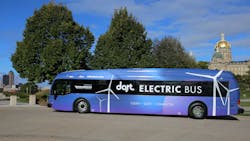DART’s all-electric, zero emission buses now in service
Iowa's first electric buses are now in service following the Des Moines Area Regional Transit Authority's (DART) electric buses entering service on Local Route 60—the University/Ingersoll loop in Des Moines.
DART is testing seven electric buses as part of a pilot project made possible thanks to a public-private partnership with MidAmerican Energy, who signed on to provide the local match for DART’s Low- or No-Emission grant application with the Federal Transit Administration (FTA).
DART’s fleet of electric buses were manufactured in the United States by Proterra. The buses offer a quieter ride for reduced noise pollution, greater efficiency and lower operating costs with fewer parts compared to combustion engine vehicles.
“Today, in an effort to operate efficiently and embrace innovative technologies, DART has joined other cities across the country by putting electric buses into service,” said DART CEO Elizabeth Presutti. “As an organization, we are excited to offer cleaner transportation to Greater Des Moines, saving money in operating and maintenance costs. This milestone would not be possible without MidAmerican Energy’s commitment to renewable energy and our community.”
DART will spend the first 12 months closely monitoring and evaluating how the buses perform both individually and against their diesel counterparts. DART has identified several measures to track overall performance and long-term financial savings. Key performance indicators DART will monitor include:
- Range, which monitors how far the vehicles will travel on a full charge. DART will also measure what factors affect the range of the vehicle and how it can manage these factors to maximize range and minimize expense. The buses get an estimated 150-230 miles per charge.
- Down time, which is the amount of time a bus is not operational due to maintenance.
- Cost of preventative maintenance. With 30 percent fewer parts, the electric buses should need less maintenance and also experience less brake wear due to the unique braking system.
- Fuel cost and energy expense.
- Long-term viability of the carbon fiber composite body. Normal bus bodies corrode and rust over time, typically in 13–15 years.
“As excited as we are for riders to experience the difference, everyone will benefit from the introduction of electric buses,” added Presutti. “I hope you will catch a ride on Iowa’s first electric buses and learn firsthand how they are clean, quiet and support DART’s mission of connecting our communities.”



